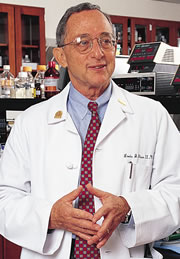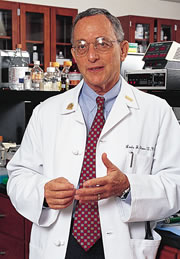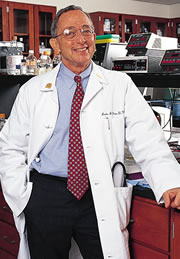|
 he
School of Medicine is centralizing and expanding its research in genetics
at the new Dr. John T. Macdonald Foundation Center for Medical Genetics.
The center will be multidisciplinary but has its origins in the Departments
of Pediatrics and Neurology. Recruited to lead the initiative is Louis
J. Elsas, M.D., who established Emory University’s acclaimed
genetics program. Elsas discussed the promise of genetics and his plans
for the center with Christine Morris, associate vice president for
communications at the School of Medicine. he
School of Medicine is centralizing and expanding its research in genetics
at the new Dr. John T. Macdonald Foundation Center for Medical Genetics.
The center will be multidisciplinary but has its origins in the Departments
of Pediatrics and Neurology. Recruited to lead the initiative is Louis
J. Elsas, M.D., who established Emory University’s acclaimed
genetics program. Elsas discussed the promise of genetics and his plans
for the center with Christine Morris, associate vice president for
communications at the School of Medicine.
CM Why is it important
for a medical school to have a strong genetics program?
LE The study of genes
in the human system promises to alter the attitude of health care delivery.
Medical genetics—a recognized specialty
of the American Medical Association—identifies and studies the
normal and abnormal mechanisms by which information is transmitted
from individual to individual and from cell to cell. With this knowledge
we will identify the individual’s and the family’s genetic
susceptibility to the environment and develop interventions that will
prevent premature morbidity and mortality and maintain optimum health.
The future of gene-based medicine will be a
complete turnabout, from an emphasis on taking care of you after you’re
sick and have irreversible damage, to predicting where your susceptibilities
lie
and intervening to prevent that expected outcome. The needs are vast,
and the numbers of certified medical geneticists are small.
There is a lot of resistance to this predictive-preventive approach
in established medicine because society is not prepared for it and
the available interventions are few. Western culture promotes the Cassandra
myth, suggesting that the ability to foretell the future is bad and
that privacy is more important. Genetics must overcome the misconception
that its predictive power is bad and, with further research, formulate
more interventions that succeed in preventing poor outcomes.
CM Are there disciplines
where your formula of prediction, intervention, and
prevention is already working?
LE Yes, the screening
of all newborns for inherited metabolic disorders is a paradigm for
prevention of mental retardation and premature mortality.
We are working with the Legislature to expand Florida’s newborn
screening program because
there are many more disorders that can
be prevented in the newborn that we’re
not screening for at a public health level. Additionally, common adult-onset
disorders—cancer, heart disease, stroke, diabetes—are caused
by many genes producing susceptibility on which the environment works
to produce disease with increasing time of exposure. Medical
genetics will determine these genes, the environmental factors, and
appropriate interventions through continued research.
|
|
CM How will you go about building a genetics program at the University?
LE I’m here as the developer of a vision. After studying biochemistry
at Harvard and medicine at the University of Virginia, and spending
several years as a resident, fellow, and assistant professor at Yale,
I went home to Atlanta in 1970 to establish a genetics discipline at
Emory. In general, during the 1970s medical school faculty did not
teach genetics. Over three decades Emory developed a Department of
Human Genetics with 27 faculty members. On a national level, by working
with people like Rodney Howell [longtime chairman of UM’s Department
of Pediatrics] and the American College of Medical Genetics, the discipline
of medical genetics became recognized as a specialty of medicine.
So, at age 65 and having been part of the development
of national and university programs, I decided to “retire” from a strong
program at Emory and come to the University of Miami and help develop
the “Miami Gene Team.” Very few people have had the opportunity
to build two programs. The Dr. John T. Macdonald Foundation Center
for Medical Genetics will be a multidisciplinary center that will work
with existing geneticists at the University and recruit new scientists,
who, together, will catalyze an outstanding, internationally recognized
program.
CM Do you envision a specific area of focus for the center?
LE My background is
in biochemical research and application of “metabolomics.” Genomics,
the mapping of the human genome, is complete. Translating that into
benefits to society will require that we understand how the products
of these genes, the proteins, function in the cells and in the intact
organism. When those proteins are impaired by mutation, we need to
determine how the organism either compensates or fails. When we understand
normal and abnormal function, we can intervene to prevent failure and
return homeostasis. We will use the tools of genomics and proteomics,
but in building a new program, you need to push the envelope a little
further than where the rest of the world is. I think metabolomics
is an area we can get into and be a leader fairly fast.
We’ve
made a lot of progress, but the translation of research into practice
has been slow. There are a few clear examples of how
metabolomics can work: One in 500 individuals has high blood cholesterol
levels because of one gene that affects the ability of cholesterol
to get into cells. We know from metabolomics, from the study of genes
controlling cholesterol metabolism, that the result of that gene is
overproduction of cholesterol by the affected cell. If you can stop
the overproduction of cholesterol, with consequent disposition in vessels
and heart disease, you can reduce the risk that that mutant gene creates
for early onset of heart disease. Statin drugs were developed that
interfere with the overproduction of cholesterol in affected cells
by preventing the response of the affected cell to lower cholesterol
in the cell. This is an example of one major gene that causes early
onset heart disease, but only for about 10 percent of all causes of
heart disease. This shows there is more research to be accomplished.
Another example is the recent breakthrough in chronic myeloid leukemia.
A genetic transformation of a protein called a kinase results in the
cell growing out of control, and a drug called Gleevec will interfere
with that specific mutated kinase. It’s a cure for one form of
cancer caused by a chromosomal variation that produces a “turned
on” signal for cell growth.
CM What is the larger educational role of a university genetics center?
LE The community,
consumers, educators, and health professionals all are interested in
learning about genetics. Conveying information to
patients’ families, helping them figure out what to do, and determining
appropriate interventions are part of our responsibility as physician-geneticists.
The Dr. John T. Macdonald Foundation understood this and put a large
amount of its revenue into this center’s development. I feel
responsible to the Miami-Dade County population to make this work,
to bring physician-scientists and educators to campus who work in medical
genetics, so the discipline can be advanced and the community benefited.
We need a critical mass of investigators, educators, and practitioners
to further knowledge and establish laboratory, clinical, and educational
services in medical genetics. Then, when a patient has a history of
a common, polygenic problem like familial cancer, we can help the family
and the physician find resources to diagnose and prevent cancer in
the family and patient. We want a resource here that can provide DNA
analysis, explain when mutational analysis is appropriate or inappropriate,
what the results mean, and how those results can be used to prevent
cancer.
We will work to integrate genetics into the medical curriculum—it’s
not an isolated discipline but a knowledge base that should be pervasive
in all clinical departments. New faculty will support existing training
and offer new human genetics education to graduate programs in arts
and sciences, medicine, marine biology, etc.
We will
develop residency programs in medical genetics and integrate this with
other clinical disciplines.
We also will recruit investigators and clinicians to carry the knowledge,
attitudes, and skills of medical genetics into this century and the
next.
|




